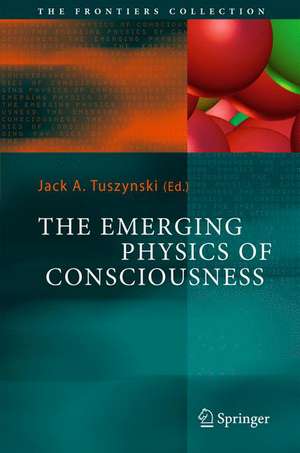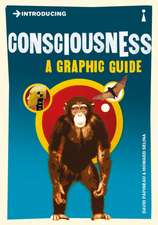The Emerging Physics of Consciousness: The Frontiers Collection
Editat de Jack A. Tuszynskien Limba Engleză Hardback – 22 iun 2006
| Toate formatele și edițiile | Preț | Express |
|---|---|---|
| Paperback (1) | 481.34 lei 6-8 săpt. | |
| Springer Berlin, Heidelberg – 12 feb 2010 | 481.34 lei 6-8 săpt. | |
| Hardback (1) | 604.37 lei 6-8 săpt. | |
| Springer Berlin, Heidelberg – 22 iun 2006 | 604.37 lei 6-8 săpt. |
Din seria The Frontiers Collection
-
 Preț: 298.66 lei
Preț: 298.66 lei -
 Preț: 351.90 lei
Preț: 351.90 lei -
 Preț: 297.61 lei
Preț: 297.61 lei - 17%
 Preț: 366.24 lei
Preț: 366.24 lei - 8%
 Preț: 462.91 lei
Preț: 462.91 lei -
 Preț: 308.36 lei
Preț: 308.36 lei -
 Preț: 395.47 lei
Preț: 395.47 lei -
 Preț: 323.05 lei
Preț: 323.05 lei -
 Preț: 215.30 lei
Preț: 215.30 lei -
 Preț: 312.94 lei
Preț: 312.94 lei - 17%
 Preț: 493.43 lei
Preț: 493.43 lei -
 Preț: 381.15 lei
Preț: 381.15 lei -
 Preț: 271.81 lei
Preț: 271.81 lei -
 Preț: 396.40 lei
Preț: 396.40 lei -
 Preț: 208.95 lei
Preț: 208.95 lei - 17%
 Preț: 525.37 lei
Preț: 525.37 lei - 20%
 Preț: 340.49 lei
Preț: 340.49 lei -
 Preț: 225.86 lei
Preț: 225.86 lei -
 Preț: 283.50 lei
Preț: 283.50 lei -
 Preț: 346.61 lei
Preț: 346.61 lei -
 Preț: 270.72 lei
Preț: 270.72 lei - 15%
 Preț: 536.96 lei
Preț: 536.96 lei - 5%
 Preț: 383.93 lei
Preț: 383.93 lei -
 Preț: 500.84 lei
Preț: 500.84 lei -
 Preț: 484.69 lei
Preț: 484.69 lei - 15%
 Preț: 590.16 lei
Preț: 590.16 lei - 15%
 Preț: 534.82 lei
Preț: 534.82 lei - 15%
 Preț: 481.34 lei
Preț: 481.34 lei - 15%
 Preț: 640.24 lei
Preț: 640.24 lei -
 Preț: 401.79 lei
Preț: 401.79 lei - 15%
 Preț: 595.68 lei
Preț: 595.68 lei -
 Preț: 388.34 lei
Preț: 388.34 lei -
 Preț: 390.63 lei
Preț: 390.63 lei - 15%
 Preț: 478.05 lei
Preț: 478.05 lei - 15%
 Preț: 475.15 lei
Preț: 475.15 lei - 15%
 Preț: 534.36 lei
Preț: 534.36 lei -
 Preț: 389.49 lei
Preț: 389.49 lei -
 Preț: 493.85 lei
Preț: 493.85 lei -
 Preț: 394.29 lei
Preț: 394.29 lei -
 Preț: 459.92 lei
Preț: 459.92 lei
Preț: 604.37 lei
Preț vechi: 711.03 lei
-15% Nou
Puncte Express: 907
Preț estimativ în valută:
115.66€ • 125.59$ • 97.15£
115.66€ • 125.59$ • 97.15£
Carte tipărită la comandă
Livrare economică 23 aprilie-07 mai
Preluare comenzi: 021 569.72.76
Specificații
ISBN-13: 9783540238904
ISBN-10: 3540238905
Pagini: 508
Ilustrații: XVI, 487 p. 140 illus., 5 illus. in color.
Dimensiuni: 155 x 235 x 36 mm
Greutate: 0.98 kg
Ediția:2006
Editura: Springer Berlin, Heidelberg
Colecția Springer
Seria The Frontiers Collection
Locul publicării:Berlin, Heidelberg, Germany
ISBN-10: 3540238905
Pagini: 508
Ilustrații: XVI, 487 p. 140 illus., 5 illus. in color.
Dimensiuni: 155 x 235 x 36 mm
Greutate: 0.98 kg
Ediția:2006
Editura: Springer Berlin, Heidelberg
Colecția Springer
Seria The Frontiers Collection
Locul publicării:Berlin, Heidelberg, Germany
Public țintă
ResearchCuprins
The Path Ahead.- Consciousness and Quantum Physics: Empirical Research on the Subjective Reduction of the Statevector.- Microtubules in the Cerebral Cortex: Role in Memory and Consciousness.- Towards Experimental Tests of Quantum Effects in Cytoskeletal Proteins.- Physicalism, Chaos and Reductionism.- Consciousness, Neurobiology and Quantum Mechanics: The Case for a Connection.- Life, Catalysis and Excitable Media: A Dynamic Systems Approach to Metabolism and Cognition.- The Dendritic Cytoskeleton as a Computational Device: An Hypothesis.- Recurrent Quantum Neural Network and its Applications.- Microtubules as a Quantum Hopfield Network.- Consciousness and Quantum Brain Dynamics.- The CEMI Field Theory: Seven Clues to the Nature of Consciousness.- Quantum Cosmology and the Hard Problem of the Conscious Brain.- Consciousness and Logic in a Quantum-Computing Universe.
Recenzii
From the reviews:
“The intention of the book was clearly to present many different views of the consciousness problem, and as such it succeeds extremely well. … If you are interested in consciousness and its interaction with the physical and biological worlds, this is an excellent book that I recommend highly.” (Philosophy, Religion and Science Book Reviews, bookinspections.wordpress.com, March, 2014)
“The intention of the book was clearly to present many different views of the consciousness problem, and as such it succeeds extremely well. … If you are interested in consciousness and its interaction with the physical and biological worlds, this is an excellent book that I recommend highly.” (Philosophy, Religion and Science Book Reviews, bookinspections.wordpress.com, March, 2014)
Notă biografică
Professor Jack Tuszynski received his M.Sc. with distinction in Physics from the University of Poznan (Poland) in 1980. He received his Ph.D. in Condensed Matter Physics from the University of Calgary in 1983. He held a Post-Doctoral Fellowship at the University of Calgary Chemistry Department in 1983. He was an Assistant Professor at the Department of Physics of the Memorial University of Newfoundland from 1983 to 1988, and at the University of Alberta Physics Department from 1988 to 1990. He joined the University of Alberta Physics Department in 1993. He is on the editorial board of the Journal of Biological Physics.
Textul de pe ultima copertă
Consciousness remains one of the major unsolved problems in science. How do the feelings and sensations making up conscious experience arise from the concerted actions of nerve cells and their associated synaptic and molecular processes? Can such feelings be explained by modern science, or is there an entirely different kind of explanation needed? And how can this seemingly intractable problem be approached experimentally? How do the operations of the conscious mind emerge out of the specific interactions involving billions of neurons? This book seeks answers to these questions on the underlying assumption that consciousness can be understood using the intellectual potential of modern physics and other sciences. There are a number of theories of consciousness, some based on classical physics while others require the use of quantum concepts. The latter ones have drawn criticism from the parts of the scientific establishment while simultaneously claiming that classical approaches are doomed to failure. The contributing authors present a spectrum of opinions from both sides of this on-going scientific debate, allowing readers to decide for themselves which of the approaches are most likely to succeed.
Caracteristici
Addresses the nature of consciousness: one of the major unsolved questions in science Proceeds from the assumption that consciousness can be understood using the intellectual potential of modern physics and other sciences Reviews competing theories of consciousness, some based on classical physics while others require the use of quantum concepts Presents a spectrum of opinions in this on-going scientific debate, allowing readers to decide for themselves which of the approaches are most likely to succeed Includes supplementary material: sn.pub/extras













